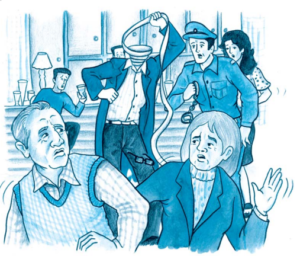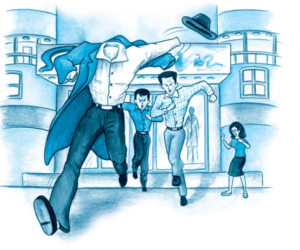The NCERT Solutions for Class 10 English Chapter 5 – “Footprints without Feet” provides detailed and thoughtful answers to all the questions in the chapter. Written by H.G. Wells, this science fiction story revolves around Griffin, a brilliant but eccentric scientist who discovers how to make himself invisible. However, instead of using his invention for good, Griffin misuses his power to steal and terrorize people. The story explores his misadventures as he tries to survive while remaining invisible.
NCERT Solutions for Class 10 English Chapter 5 – Footprints without Feet
Question 1:
How did the invisible man first become visible?
Answer:
Griffin, the invisible man, first became apparent when he walked into the mud, leaving his footsteps all over the stairs of a home in the heart of London. Two youngsters spotted his footprints and followed them, captivated, until the muddy traces got fainter and fainter, until disappearing entirely. He got away easily enough from the youngsters who followed his tracks in London.
Because it being mid-winter, he snuck into a large London store to stay warm and slept there while purchasing shoes, an overcoat, and a wide-brimmed hat. When he donned the clothing, he became noticeable to the store staff when the business opened in the morning. Afterward, he had to shed all of his clothes to escape from them and became invisible again.
Question 2:
Why was he wandering the streets?
Answer:
Griffin was a talented scientist, but he was a lawless individual. His landlord despised him and attempted to oust him from the home. In vengeance, the scientist set fire to the house. To flee the scene, he stripped naked and became a homeless wanderer walking the streets of London, without clothing, money, or identity.
NCERT Solutions for Class 10 English Chapter 5 – Footprints without Feet
Read and Find Out
Question 1:
Why does Mrs Hall find the scientist eccentric?
Answer:
The presence of a stranger with a unique look at an inn in mid-winter was extraordinary in and of itself. Mrs Hall attempted to be nice to Griffin, but he reacted coldly. He refused her, claiming he didn’t want to talk to anyone and had come there for privacy, not to be bothered while working. Mrs. Hall considered the scientist to be strange for all of these reasons.
Question 2:
What curious episode occurs in the study?
Answer:
The pastor and his wife were awakened early one morning by sounds emanating from their study. Creeping downstairs, they heard coins being removed from the clergyman’s desk. To their surprise, when they entered the study, it was empty. He and his wife peered beneath the desk, behind the drapes, and up the chimney. They didn’t locate anyone there, though. However, the desk was discovered unlocked, and the housekeeping money was also stolen.
Question 3:
What other extraordinary things happen at the inn?
Answer:
A succession of strange events occurred at the inn. When Mrs Hall and her husband entered the scientist’s chamber, they discovered the door wide open. Normally, it was always closed and locked, and the scientist was enraged if anybody entered his chamber. However, when Mrs Hall and her husband looked through the door, he was nowhere to be seen.
His clothing and bandages, which he normally wore, were scattered around the room. Mrs Hall heard a sniff near her ear, and the hat on the bedpost sprang up and raced into her face. The bedroom chair leaped into the air and pushed them both out of the room before slamming and locking the door behind them. All of these experiences led Mrs Hall to think that her furniture and the room were haunted by ghosts and that the stranger had somehow induced them to infiltrate her furniture.

NCERT Solutions for Class 10 English Chapter 5 – Footprints without Feet
Think about it
Question 1:
“Griffin was rather a lawless person.” Comment.
Answer:
Griffin was a lawbreaker who did not hesitate to injure others in order to further his own objectives. When attempting to remove the scientist from his home, he set fire to the landlord’s residence. He then robbed clothing stores and took money from Mrs. Hall’s residence, which was held for housekeeping reasons inside the study room desk.
However, when the landlady saw him at the inn, he flung a chair at her and her husband. Finally, he fled from the clutches of Mr Jaffers, the policeman who had arrived to arrest him for his crimes. Lawless individuals, like Griffin, are vindictive by nature and do not consider the safety and well-being of others in society. They are simply self-obsessed and think about themselves.
Question 2:
How would you assess Griffin as a scientist?
Answer:
Griffin was a bright scientist who found the scientific formula for making the human body invisible. This was a significant scientific feat. He did, however, appear to appreciate the sense of power that comes with becoming invisible. He abused his findings to satisfy his selfish cravings and derive sadistic pleasure from hurting others. Although he was talented at his profession, he was not a noble scientist who contributed to the greater good of society. Thus, his discovery of invisibility was only for his personal gain.
NCERT Solutions for Class 10 English Chapter 5 – Footprints without Feet
Talk about it
Question 1:
Would you like to become invisible? What advantages and disadvantages do you foresee, if you did?
Answer:
Yes, most individuals would find it interesting to become invisible. Invisibility, like every coin, may have both advantages and downsides. One significant benefit of being invisible for military troops is that it allows them to preserve law and order in society by following unlawful actions committed by anti-social groups without their awareness and putting an end to the annoyance produced by terrorists or criminals. On the happier side, being invisible allows a youngster to perform pranks on his peers without being detected. However, one consequence of invisibility is solitude and the lack of friends and family to share joys and sorrows. A person is likely to become like the eccentric scientist Griffin, as described in this narrative.
Question 2:
Are there forces around us that are invisible, such as magnetism? Are there aspects of matter that are ‘invisible’ or not visible to the naked eye? What would the world be like if you could see such forces or such aspects of matter?
Answer:
Yes, electrostatic and magnetic forces are excellent examples of unseen forces. Matter’s atoms and molecules are too small to be seen with the human eye. Similarly, sound and heat energy are also translucent and cannot be seen. Although it is an amazing notion to observe unseen entities, their sight may cause a number of concerns. For example, if we are able to see the magnetic force, it may cause significant annoyance to our senses.
Question 3:
What makes glass or water transparent (what is the scientific explanation for this)? Do you think it would be scientifically possible for a man to become invisible, or transparent? (Keep in mind that writers of science fiction have often turned out to be prophetic in their imagination!)
Answer:
We know that light can flow through glass and water since they are transparent. When light rays strike an item, the reflected light makes the object visible to us. Similarly, if a comparable technology can be developed to eliminate light reflection from the human body, the human body will become translucent and undetectable.
NCERT Solutions for Class 10 English Chapter 5 – Footprints without Feet
For the Next Chapter Solution Click Below
CHAPTER 1 – A Triumph of Surgery
CHAPTER 3 – The Midnight Visitor
CHAPTER 4 – A Question of Trust
CHAPTER 5 – Footprints without Feet
CHAPTER 6 – The Making of a Scientist
CHAPTER 10 – The Book That Saved the Earth


